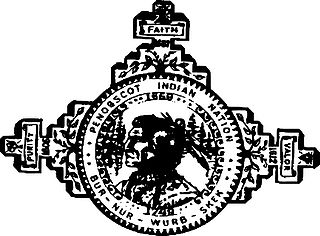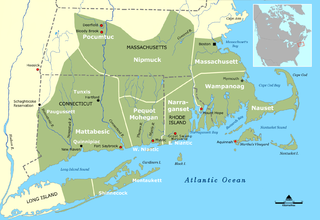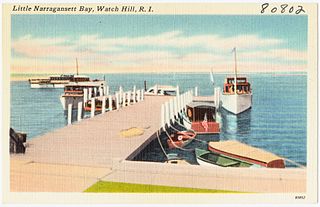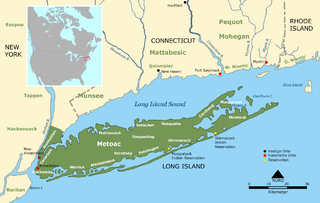Related Research Articles

Roger Williams was an English-born New England Puritan minister, theologian, and author who founded Providence Plantations, which became the Colony of Rhode Island and Providence Plantations and later the State of Rhode Island. He was a staunch advocate for religious freedom, separation of church and state, and fair dealings with the Native Americans.

Narragansett is a town in Washington County, Rhode Island, United States. The population was 14,532 at the 2020 census. However, during the summer months the town's population more than doubles to near 34,000. The town of Narragansett occupies a narrow strip of land running along the eastern bank of the Pettaquamscutt River to the shore of Narragansett Bay on the Atlantic Ocean. It was separated from South Kingstown in 1888 and incorporated as a town in 1901. With several ocean beaches and a walkable strip along the ocean front, Narragansett is a resort area in the summer season as well as a popular East Coast surfing spot due to frequent southerly swells from Atlantic Ocean.

North Kingstown is a town in Washington County, Rhode Island, United States, and is part of the Providence metropolitan area. The population was 27,732 in the 2020 census. North Kingstown is home to the birthplace of American portraitist Gilbert Stuart, who was born in the village of Saunderstown. Within the town is Quonset Point, location of the former Naval Air Station Quonset Point, known for the invention of the Quonset hut, as well as the historic village of Wickford.

King Philip's War was an armed conflict in 1675–1676 between a group of indigenous peoples of the Northeastern Woodlands against the English New England Colonies and their indigenous allies. The war is named for Metacom, the Pokanoket chief and sachem of the Wampanoag who adopted the English name Philip because of the friendly relations between his father Massasoit and the Plymouth Colony. The war continued in the most northern reaches of New England until the signing of the Treaty of Casco Bay on April 12, 1678.

The Penobscot are an Indigenous people in North America from the Northeastern Woodlands region. They are organized as a federally recognized tribe in Maine and as a First Nations band government in the Atlantic provinces and Quebec.

The Narragansett people are an Algonquian American Indian tribe from Rhode Island. Today, Narragansett people are enrolled in the federally recognized Narragansett Indian Tribe. They gained federal recognition in 1983.

Food sovereignty is a food system in which the people who produce, distribute, and consume food also control the mechanisms and policies of food production and distribution. This stands in contrast to the present corporate food regime, in which corporations and market institutions control the global food system. Food sovereignty emphasizes local food economies, sustainable food availability, and centers culturally appropriate foods and practices. Changing climates and disrupted foodways disproportionately impact indigenous populations and their access to traditional food sources while contributing to higher rates of certain diseases; for this reason, food sovereignty centers indigenous peoples. These needs have been addressed in recent years by several international organizations, including the United Nations, with several countries adopting food sovereignty policies into law. Critics of food sovereignty activism believe that the system is founded on inaccurate baseline assumptions; disregards the origins of the targeted problems; and is plagued by a lack of consensus for proposed solutions.

The Colony of Rhode Island and Providence Plantations was one of the original Thirteen Colonies established on the east coast of America, bordering the Atlantic Ocean. It was founded by Roger Williams. It was an English colony from 1636 until 1707, and then a colony of Great Britain until the American Revolution in 1776, when it became the State of Rhode Island and Providence Plantations.

The Pokanoket are a group of Wampanoag people and the village governed by Massasoit, chief sachem of the Wampanoag people.

The Niantic are a tribe of Algonquian-speaking American Indians who lived in the area of Connecticut and Rhode Island during the early colonial period. The tribe's name Nehântick means "of long-necked waters"; area residents believe that this refers to the "long neck" or peninsula of land known as Black Point, located in the village of Niantic, Connecticut.

The Algonquians are one of the most populous and widespread North American native language groups. They historically were prominent along the Atlantic Coast and in the interior regions along Saint Lawrence River and around the Great Lakes. This grouping consists of the peoples who speak Algonquian languages.

Little Narragansett Bay is an inlet of the Atlantic Ocean and an estuary of the Pawcatuck River on the Rhode Island–Connecticut state line. It is sheltered by the curving peninsula of Napatree Point.

Chepiwanoxet is a neighborhood in Warwick, Rhode Island, with an island peninsula in Greenwich Bay, an arm of Narragansett Bay. The neighborhood straddles the Amtrak railroad lines, which lies just east of and parallel to the Post Road. Its boundaries are Neptune Street to the North, Alger Avenue to the South, Post Road to the West, and Greenwich Bay to the East. Chepiwanoxet Way, an underpass beneath the Amtrak lines, now serves as the only street access in and out of the neighborhood.

Metoac is an erroneous term used by some to group together the Munsee-speaking Lenape (west), Quiripi-speaking Unquachog (center) and Pequot-speaking Montaukett (east) American Indians on what is now Long Island in New York state. The term was invented by amateur anthropologist and U.S. Congressman Silas Wood in the mistaken belief that the various native settlements on the island each comprised distinct tribes.

Narragansett is an Algonquian language formerly spoken in most of what is today Rhode Island by the Narragansett people. It was closely related to the other Algonquian languages of southern New England like Massachusett and Mohegan-Pequot. The earliest study of the language in English was by Roger Williams, founder of the Rhode Island colony, in his book A Key Into the Language of America (1643).

The Narragansett Trail is a 16 miles (26 km) hiking trail located in Connecticut. It is one of the Blue-Blazed Trails maintained by the Connecticut Forest and Park Association, the Narragansett Council, and the Rhode Island chapter of Scouts BSA.
John Christian Hopkins is a Narragansett journalist, author, poet and public speaker who resides in Tuba City, Arizona, United States. After having grown up in Hope Valley, Rhode Island, Hopkins graduated from the University of Rhode Island with degrees in journalism and history in 1987.
The Wunnashowatuckoog, sometimes referred to as Showatucks, were a native American tribe in Massachusetts who lived in southern Worcester County, Massachusetts. The name of the tribe, translating to 'people at the fork of the river', alludes to them residing on the Blackstone River. They were known to cohabitate with the Monashackotoog.
Ella Wilcox-Thomas Sekatau, or Firefly-Song of Wind, was a poet, historian, and ethnohistorian and medicine woman of the Narragansett Indian Nation. Instrumental in the Narragansett's federal recognition in 1983, she was a powerful cultural and political presence in her community and across the Native American community of New England. Sekatau was one of the first Native American interpreters to partner with Brown University's Heffenreffer Museum of Anthropology in their education program, and was also a key figure for the Wampanoag history program at Plimoth Plantation, now Plimoth Patuxet.

The Northern Narragansett Indian Tribe of Rhode Island is an unrecognized tribe in Rhode Island, founded by formerly enrolled members of the federally recognized Narragansett Tribe, who were removed from the tribal rolls in the group removals of 1993 and 2006. The tribe acquired 501(c)(3) status in 2010.
References
- Donald Ricky (1 January 1998). Encyclopedia of New Jersey Indians: Encyclopedia of Native Peoples. Somerset Publishers, Inc. p. 192. ISBN 978-0-403-09331-1.